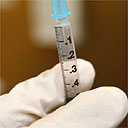
Panic demands for the flu vaccine in the wake of the avian flu scare have depleted stocks to such critical levels that there may be insufficient to inoculate the elderly and others most at risk of infection during the winter. Doctors have now been told to give the jabs only to people over 65 or with chronic conditions.
The restrictions have been brought in after a potentially catastrophic run on supplies by what health officials are calling the "worried well". Nearly all the 14m doses originally ordered locally have been used, as have 400,000 in emergency supplies held by the Department of Health. It has ordered another 200,000.
Some GP practices have run dry of the vaccine, and officials are in urgent talks with the manufacturers. However, company reserves are limited owing to demand across Europe, and production arrangements mean they cannot increase stocks within the current flu "season".
The Department of Health says it still hopes that all those most at risk will be offered vaccination, but some GPs with fewer vulnerable patients must allow their supplies to be redistributed to other practices. About 12,000 Britons die on average each winter because of flu complications - but this rose to 30,000 in 1989-90, and 22,000 five years ago.
The outbreak of flu has been relatively limited so far this year, and health officials are hoping that further supplies will be available by late January.
Doctors' leaders said that there was no evidence GPs had been giving the vaccine inappropriately. Mayur Lahhani, chairman of the Royal College of General Practitioners, said he was sure that "by and large, all flu vaccines are being given only to high-risk patients. As a college, we agree with a targeted approach to flu immunisation." Publicity over avian flu and speculation that a pandemic in humans may be imminent has led more people to have jabs, even though the vaccine is unlikely to protect against bird flu.
David Salisbury, head of the government's immunisation programme, told GPs in England that only the at-risk groups - the over-65s, those with respiratory, heart, kidney and other chronic conditions such as diabetes, and their main carers and NHS frontline staff - should be given free jabs. He told journalists: "If we go out and buy all this extra vaccine and find it has been going to the worried well, and people with risk factors have been missed out, I for one would be most concerned about that."
More than seven in 10 patients over 65 received jabs last year, but the take-up in other risk groups was less than 50%, and the government launched an advertising campaign to improve that. Dr Salisbury said the picture on the ground was mixed. He had heard of one doctor who had ordered only 650 doses of vaccine when he had 1,200 at-risk patients. North Lincolnshire was claiming to have already immunised 97% of its at-risk patients.
He insisted that the estimate of vaccine needed at a national level - 14m doses, both for the NHS and private clinics - was "far in excess of what was required". This included 8m for the over-65s and 3m for other risk groups. Only five years ago just 7m doses were ordered. The system of ordering flu vaccine would be reviewed.
He said any pandemic flu vaccine, once one became available, would be controlled from Whitehall. In contrast, seasonal flu vaccine was ordered by GP practices in England and Wales, and by pharmacies in Scotland, with local NHS trusts reimbursing them at about £8 a dose. Doctors were also paid a fee for giving jabs.

